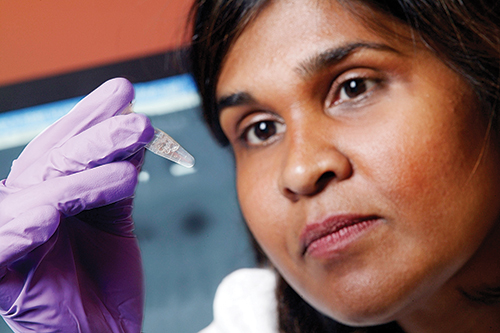Last month, in rural Mississippi, doctors announced that a baby had been cured of an HIV infection. Since HIV may be passed from mother to child during pregnancy, birth or breastfeeding, doctors normally check pregnant women for HIV long before delivery. In the case of this baby’s mother, she arrived at the hospital already in labor. She hadn’t seen a doctor and was unaware that she was HIV-positive.
Baby ‘cured’ of HIV?

Last month, in rural Mississippi, doctors announced that a baby had been cured of an HIV infection. Since HIV may be passed from mother to child during pregnancy, birth or breastfeeding, doctors normally check pregnant women for HIV long before delivery. In the case of this baby’s mother, she arrived at the hospital already in labor. She hadn’t seen a doctor and was unaware that she was HIV-positive.
Preliminary tests indicated that the mother was likely positive, so the hospital transferred the baby to another medical center, where she underwent two different types of HIV tests. The virus was found in her blood. Virus levels were fairly low, though, which indicated that the baby had been infected in the womb and not during delivery.
Doctors began to aggressively treat the baby girl with antiretroviral drugs 30 hours after birth. Normally these drugs wouldn’t be used; usually, smaller amounts of drugs are given as a prophylactic measure. Within the first month of the baby’s life she’d had five HIV tests, all showing that she was HIV-positive. The baby then received treatments for 18 months until the mother stopped coming to appointments.
Doctors expected to see higher viral loads when the child returned five months later. Instead, test results showed she was HIV-negative. Now that the baby is almost 3 years old, her doctors consider her to be “functionally cured.”
Some doctors are skeptical because these findings haven’t been replicated and the case has yet to be published in a peer-reviewed journal. In a piece in The Wall Street Journal, Dr. Mark Siedner challenged the baby’s infection versus exposure. He wrote that “it seems more likely that her treatment prevented her, after exposure to HIV, from being infected.”
But other doctors have already suggested that this case might signify something different in the immune systems of newborns that can be harnessed to combat the spread of HIV.
If this can be confirmed, it could have major repercussions regarding the medical response to HIV-positive newborns. In the U.S., mothers who test positive for HIV are generally treated during pregnancy and babies are then given prophylactics after birth, so the number of cases of babies born with HIV are actually quite low. But in other countries this isn’t the case.
According to The New York Times, South African babies aren’t even routinely tested until six weeks after birth, long after the Mississippi baby began receiving aggressive treatment. While the potential existence of a second person that may have been cured of HIV is cause to celebrate, it also brings to light some other facts regarding HIV treatment.
According to the Centers for Disease Control, far too many people who have HIV don’t know it.
In 2009, more than one-third of people who tested positive for HIV were diagnosed with AIDS within a year, suggesting that they were infected with HIV for many years without realizing it.
Just a couple of days ago I read an autobiographical piece by a man who suspected he might have engaged in sex with a person who was HIV-positive and neglected to get tested for years out of fear of the stigma attached to HIV. While this man eventually found out he did not have HIV, the fact that there are still people not getting tested even though they have access to testing is problematic.
Approximately one in five of the estimated 1.1 million Americans living with HIV aren’t aware that they are infected. While there is still no cure for HIV, there are a number of life-extending treatments available today, as well as a number of ways to ensure that those who have tested positive do not pass along the virus to their partners or, as in the case of the Mississippi mother, their children.
While we have a long way to go toward destigmatizing HIV, as well as a long way to go toward treating the virus and one day finding a cure, one thing that we can all do for ourselves is get tested regularly.
Along with other safe sex practices like using effective protection, getting tested often increases the likelihood of receiving appropriate treatment if you do test positive and reduces the chances of passing HIV to others.
We can hope that the case of this one infant has far-reaching effects in HIV treatment for others. But getting tested and encouraging others to get tested will also have a positive impact in the fight against this virus.







